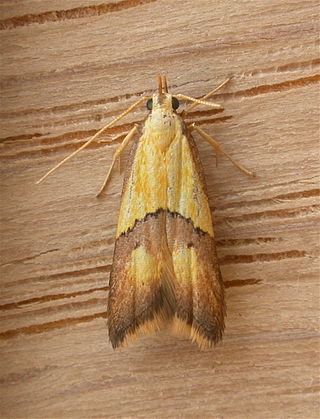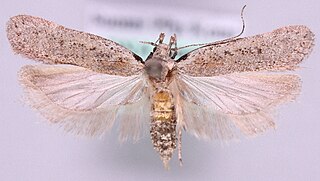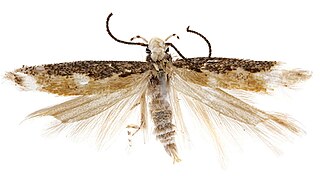
Pyraustinae is a large subfamily of the lepidopteran family Crambidae, the crambid snout moths. It currently includes about 1,280 species Most of them tropical but some found in temperate regions including both North America and Europe.

The Lecithoceridae, or long-horned moths, are a family of small moths described by Simon Le Marchand in 1947. Although lecithocerids are found throughout the world, the great majority are found in the Indomalayan realm and the southern part of the Palaearctic realm.

Aristotelia is a genus of moths in the family Gelechiidae. Well-known species are food plant specialists, and diverse hosts are used – Salicaceae, Solanaceae, Rosaceae, Fagaceae, Fabaceae, Asteraceae.

Dichomeris is a genus of moths in the family Gelechiidae erected by Jacob Hübner in 1818.

Gelechia is a genus of moths in the family Gelechiidae. The type species is Gelechia rhombella.
Physoptila is a genus of moth in the family Gelechiidae.

Imma is a large genus of moths in the obtectomeran "micromoth" family Immidae. This is the type genus of its family. They are widespread in the tropics, with most species occurring between the Himalayas and the Oceanian region; the genus is furthermore plentiful in the Neotropics, but not very diverse in the Afrotropics.
Asymphorodes is a gelechioid moth genus in subfamily Agonoxeninae of the palm moth family (Agonoxenidae), whose taxonomic status is disputed. Alternatively, the palm moths might be a subfamily of the grass-miner moth family (Elachistidae), with the Agonoxeninae becoming a tribe Agonoxenini.
Peridaedala is a genus of moths belonging to the subfamily Olethreutinae of the family Tortricidae.

Dichelopa is a genus of moths belonging to the subfamily Tortricinae of the family Tortricidae.

The Eucosmini are a tribe of tortrix moths.

Stigmella is a genus of moths of the family Nepticulidae. The genus was erected by Franz von Paula Schrank in 1802.
Physoptilinae is a subfamily of moths in the family Gelechiidae.

Acrocercops is a genus of moths in the family Gracillariidae.

Xyloryctidae is a family of moths contained within the superfamily Gelechioidea described by Edward Meyrick in 1890. Most genera are found in the Indo-Australian region. While many of these moths are tiny, some members of the family grow to a wingspan of up to 66 mm, making them giants among the micromoths.
Musotiminae is a subfamily of the lepidopteran family Crambidae. It was described by Edward Meyrick in 1884

Gelechiinae is a subfamily of moths in the family Gelechiidae. It was described by Henry Tibbats Stainton in 1854.

Anacampsinae is a subfamily of moths in the family Gelechiidae.
Physoptila scenica is a moth of the family Gelechiidae. It was described by Edward Meyrick in 1914. It is found in southern India.










